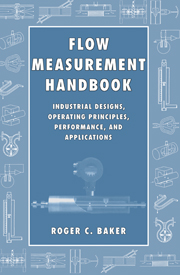Book contents
- Front Matter
- Contents
- Preface
- Acknowledgments
- Nomenclature
- Chapter 1 Introduction
- Chapter 2 Fluid Mechanics Essentials
- Chapter 3 Specification, Selection, and Audit
- Chapter 4 Calibration
- Chapter 5 Orifice Plate Meters
- Chapter 6 Venturi Meter and Standard Nozzles
- Chapter 7 Critical Flow Venturi Nozzle
- Chapter 8 Other Momentum-Sensing Meters
- Chapter 9 Positive Displacement Flowmeters
- Chapter 10 Turbine and Related Flowmeters
- Chapter 11 Vortex-Shedding, Swirl, and Fluidic Flowmeters
- Chapter 12 Electromagnetic Flowmeters
- Chapter 13 Ultrasonic Flowmeters
- Chapter 14 Mass Flow Measurement Using Multiple Sensors for Single- and Multiphase Flows
- Chapter 15 Thermal Flowmeters
- Chapter 16 Angular Momentum Devices
- Chapter 17 Coriolis Flowmeters
- Chapter 18 Probes for Local Velocity Measurement in Liquids and Gases
- Chapter 19 Modern Control Systems
- Chapter 20 Some Reflections on Flowmeter Manufacture, Production, and Markets
- Chapter 21 Future Developments
- Bibliography
- A Selection of International Standards
- Conferences
- References
- Index
Chapter 16 - Angular Momentum Devices
Published online by Cambridge University Press: 22 September 2009
- Front Matter
- Contents
- Preface
- Acknowledgments
- Nomenclature
- Chapter 1 Introduction
- Chapter 2 Fluid Mechanics Essentials
- Chapter 3 Specification, Selection, and Audit
- Chapter 4 Calibration
- Chapter 5 Orifice Plate Meters
- Chapter 6 Venturi Meter and Standard Nozzles
- Chapter 7 Critical Flow Venturi Nozzle
- Chapter 8 Other Momentum-Sensing Meters
- Chapter 9 Positive Displacement Flowmeters
- Chapter 10 Turbine and Related Flowmeters
- Chapter 11 Vortex-Shedding, Swirl, and Fluidic Flowmeters
- Chapter 12 Electromagnetic Flowmeters
- Chapter 13 Ultrasonic Flowmeters
- Chapter 14 Mass Flow Measurement Using Multiple Sensors for Single- and Multiphase Flows
- Chapter 15 Thermal Flowmeters
- Chapter 16 Angular Momentum Devices
- Chapter 17 Coriolis Flowmeters
- Chapter 18 Probes for Local Velocity Measurement in Liquids and Gases
- Chapter 19 Modern Control Systems
- Chapter 20 Some Reflections on Flowmeter Manufacture, Production, and Markets
- Chapter 21 Future Developments
- Bibliography
- A Selection of International Standards
- Conferences
- References
- Index
Summary
INTRODUCTION
I am indebted to Medlock (1989) for notes on three early devices that attempt to use change of angular momentum to obtain mass flow.
Katys (1964) used an electric synchronous motor with a special rotor supported internally in the pipe and a stator outside the pipe. Fluid passed through vanes in the rotor and acquired angular momentum. From the power used or the torque needed to drive the rotor, it was claimed that the mass flow could be deduced.
According to Medlock, the Bendix meter “measures the torque required to impart angular momentum to the liquid. One end of a calibrated spring is driven at a constant speed and the other end is connected to a freely rotatable turbine. The torsion developed in the spring is a measure of mass flow rate.”
The twin rotor turbine meter (Potter 1959) attempted to measure mass flow by means of two in-line turbine rotors of different blade angles, which are joined by a torsion spring. Despite discussions with Medlock about this meter, I am not convinced that this is a true mass flow meter and suggest that the valid derivative of the Bendix meter is the fuel flow transmitter described later.
An early design with many similarities to the current commercial designs was a device due to Orlando and Jennings (1954) shown in Figure 16.1. A constant speed motor drives an impeller imparting swirl to the liquid.
Information
- Type
- Chapter
- Information
- Flow Measurement HandbookIndustrial Designs, Operating Principles, Performance, and Applications, pp. 391 - 397Publisher: Cambridge University PressPrint publication year: 2000
